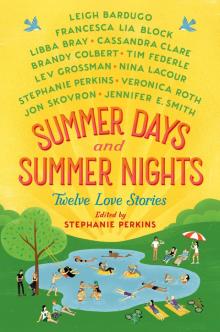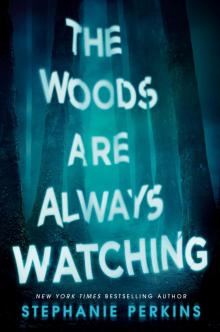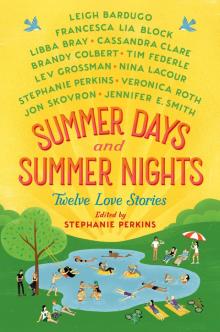- Home
- Stephanie Perkins
The Woods Are Always Watching Page 4
The Woods Are Always Watching Read online
Page 4
“Safe travels,” Heidi called from behind them.
“Lock your tent flaps,” the boy said.
As soon as they were out of earshot, Josie muttered, “That was odd.”
“I liked him. I thought it was funny.”
“Really?” Josie’s brow wrinkled. “He reminded me of my brother.”
Neena was grateful that her dark brown skin could hide a blush. “Speaking of photos,” she said, backpedaling, and they took another series of selfies to mark their progress. This time, their screened reflections were disheveled. Distant. And when Neena tucked her phone away again, her hand felt naked. Even in a relaxed state, her fingers were still gripped as if they were holding a rectangle. Nurture overtaking nature. The compulsion arose to Google if other people had this problem, too, but she knew she couldn’t.
For a moment, Neena wished they could turn around and follow the couple out. She wanted to slump in her car and lose herself in the comfort of her phone. But Josie was behind her, as always, and the thought of abandoning this trip that she herself had insisted on made her feel guilty. And then resentful for feeling guilty.
The girls slogged deeper into the lonesome infinity of forest.
THEY KEPT PLODDING, kept resting. The humid air became moist rather than fresh, and the water they drank evaporated into sweat that attracted hovering clouds of gnats. Stagnant pockets of the unseen stream bred and released mosquitos. Their arms itched with round, angry bites. Despite their being on a mountainside, there were no views. No sweeping vistas. The trees and rhododendrons enclosed them in a cramped realm.
Uneasiness settled underneath Josie’s skin. It was as if something was watching them from behind the trees, always ducking out of sight before she could name it. When the stream finally did reveal itself, the girls crossed it, and then they crossed it again a half hour later. Sometime after, a small—almost trivial—grassy clearing appeared, which Josie guessed was an empty campsite . . . which made her realize she wasn’t even positive what a campsite was supposed to look like.
Neena didn’t seem concerned. “I’m sure it’ll be obvious later.”
They trekked beside a third prong of the stream, one that was wider and prettier, and declared themselves overdue for their first real break with sitting. Glorious, glorious sitting. Proud of their cleverness, the girls shed their packs by backing up and releasing them onto waist-high boulders.
Neena inhaled with pleasure. The water warbled in an agreeable manner. “Is a creek the same thing as a stream? Or do you think there’s a scientific difference?”
“I don’t know.” Josie removed her phone from its zippered prison. A comforting rush swept over her hand, which had been tingling with emptiness since the trailhead. “I’ll look it up— Oh.”
Neena laughed once through her nose. “I keep doing that, too.”
“How did anyone know anything before the internet?”
“Our parents were idiots.”
“Or,” Josie said, “were they smarter because they actually had to retain information?”
“No.”
“Your parents, maybe.”
“No,” Neena repeated. “We’re smarter because we figured out a way where we don’t have to.”
“We are so smart to have figured that out.”
“We should figure out,” Neena said, “where we packed the snacks.”
The snacks were near the top of Josie’s pack, where she had carefully separated out this afternoon’s allocation—two single-serving bags of chips and a sandwich-size Ziploc of dried apricots—from the rest of their food. The chips were Cheetos and Nacho Cheese Doritos because the girls believed in chips that stained their fingertips orange. It was only a coincidence that the fruit was orange, too.
Josie had been in charge of snacks because she had the snack house. Neena had the meal house. When Josie’s father was alive, her parents had bought from bulk bins and had cooked giant pots of organic comfort food. Naturally, Josie had developed a taste for junk. Now she missed the rice and beans. Her mother shopped only sporadically, and the groceries were haphazard, as if she’d forgotten the purpose of shopping. Though she still patronized the same stores as before, everything became convenient to consume. Josie’s kitchen cabinets were scattered with nuts and bananas and granola—squirrel food—while an under-the-bed tub in her bedroom was stuffed with Frito-Lay variety packs and Campbell’s soup and Top Ramen, purchased with her Kmart employee discount.
The girls washed their hands with globs of sanitizer and settled onto a flat boulder that touched the stream. Unlike the other rocks, which wore fuzzy sweaters of verdant moss, this rock was bare and had perfect indentations for two human bottoms. Trees dipped their exposed roots into the water as it flowed and bubbled past. The girls’ matching blue stones of lapis lazuli shimmered in the refracted light, but Josie’s swollen finger throbbed around her ring. Her aching feet groaned in her shoes.
“This part, I understand,” Neena said. “This part where I’m sitting.”
“The whole thing should be this part.”
“Remember when we thought camping—staying in one place for three whole days—would be boring?”
Josie loosened her laces. “We were so naive. Staying in one place is the best.”
They divvied up the bounty by mixing the chips half-and-half. The apricots were placed between them. To Josie, dried fruit tasted like sadness and neglect, but today it was as delicious as candy because it gave her another reason not to move.
Her first bottle of water was already a third empty, so she took prudent sips, luxuriating as it swelled and replenished her cells. She and Neena would refill their bottles at a spring near the campsite tonight. Neither wanted to refill now because they didn’t want to carry the extra weight. Neena downed the rest of her first bottle. Recklessly, she unscrewed the lid off her second and began to chug.
“Hey!” Josie stopped her. “Save some for later.”
“I am.”
“I know, but . . . save some extra. For in case.”
“In case of what?”
“Anything,” Josie said.
“You are such a mom,” Neena said, thinking of her own mother and realizing belatedly that she’d made the slam worse. She cringed but didn’t apologize. She was embarrassed, but she also worried that acknowledging the subject might hurt Josie further. Unlike Josie’s mom, Neena’s was constantly butting in with her concerns, thoughts, and opinions. It was maddening, but Neena knew enough to be grateful.
Ma was the only person besides Josie who texted her regularly. Though she worked considerable hours as a neurologist, she was always available by phone. This afternoon was already the longest they’d gone without talking in . . . who knew how many years. Forever. This trip was a trial run for their upcoming separation. Except, even then, they would still be texting and FaceTiming.
Neena glossed over her blunder by stretching out on the rock. “Oh my God.” Her tormented muscles whimpered in relief. “Lying down is even better. You have to try this.”
“I’ll never get up if I lie down,” Josie said as she lowered herself.
They ate on their backs like otters, orange crumbs littering their bellies and chests, pacified by the babbling stream and its soft, cooling aroma. Neena sniffed the breeze. The scent was rich with minerals. Compared to Josie, Neena was always more aware of her breath. Her asthma required two puffs in the morning and two at night on a steroid inhaler, and she had a rescue inhaler for when she was sick or before exercise. She’d used the rescue inhaler on the drive here, so her lungs were okay. Of greater concern were the bruises she felt blossoming below her shoulder blades.
Her head turned toward Josie. “Oh no. Are you a little pink?”
Josie bolted upright, pressing her thumb into her forearm. A white print was left behind. Swearing, she scuttled off the rock and fumbled through her pack. H
er skin was fair and freckled and already slathered in SPF.
“Maybe it’s just warm from the exercise,” Neena said.
“No,” Josie said, reapplying. “I’m definitely burning.”
The chemical tang of sunscreen mixed into the air. Neena examined the bottle without picking it up because she didn’t want to get her hands greasy. “A hundred?”
Josie snorted. “SPF 100+. Don’t forget the ‘plus’—it’s important.”
Neena shook her head when Josie offered the bottle. She was also already wearing some, and the whole trail had been in the shade. She was fine. Josie packed up the sunscreen along with their empty food bags. The sight made Neena flinch. “My hips hurt,” she said. “And my back.” We don’t have to leave now, do we?
“Mine too,” Josie said. “And my feet.” Hell no.
They watched the water. After a few minutes, Josie began to wander and collect stones. Neena observed as Josie stacked the pile, biggest to littlest, into a satisfying decorative cairn. She croaked to her feet and joined in. Selecting, balancing. The process was both meditative and addictive, like solving a puzzle. Soon the girls had constructed an entire village out of stacked stone—a hamlet overlooking the sea. They took dozens of photographs from every angle. Neena admired their sprawling creation with pride.
“Godzilla time.” Josie reached out to topple the stacks.
Neena thrust out both hands to stop her. “What are you doing?”
“Leave No Trace.” When Neena didn’t respond, Josie went on. “Leave No Trace? It’s a thing. Like, an ethical code of honor. You’ve really never heard of it?”
Neena had not.
“It means that whatever you bring into nature, you carry out. It doesn’t only apply to garbage. You’re supposed to leave everything the way you found it. So, if we let these stones stand, we’d be leaving behind proof of human impact. It’d be like carving our names into a tree. Or throwing the Doritos bag into the ferns.”
“But . . .” Neena hesitated. Wondering if this made her a lesser person. “What if I like the idea of leaving something behind?”
“Then you’d be ruining the view for the next people who sat here.”
Josie’s pronouncement felt harsh—that their pretty stone towers could ruin anybody’s view.
“Imagine if everybody who sat here left one of these,” she continued. “This place would be nothing but stacked stones. It’d be the same as a crowd of people.”
“Okay,” Neena said, “so the next hiker who sits here gets peeved and knocks them down. Who cares? Just . . . let’s not do it ourselves.”
“We’re not leaving them.”
“Why not?”
“Because I just said!”
There was a burst of irritated silence. Once again, it was like being trapped in a loop with her mother. Neena hated feeling like a child.
“Fine,” Neena said. Childishly. “Whatever.”
Resisting the urge to add that moving rocks around could also contribute to erosion, Josie tried to spin the ring on her index finger, a nervous habit. The ring didn’t budge. Her fingers had fattened into sausages, swollen from hanging at her sides during the hike.
“How about we leave one?” she finally said. “This one.” She pointed to Neena’s tallest cairn. “I like the round stone on top. It seems like it should roll away, but it doesn’t.”
Neena shrugged.
Josie sighed. But correctly interpreting the ennui as acceptance, she dismantled the nearest tower. The rocks tumbled to the earth and splooshed into the water.
Neena joined in the demolition until they were all gone except the one. “You sure?” she asked, rearing back to kick it.
“Don’t,” Josie said.
“I wasn’t going to,” Neena lied. She glanced at her phone, which was still in her hand. “Shit. It’s a quarter till five.”
Josie was equally startled. “What?”
The girls had read that the average backpacker could hike two miles per hour, including breaks, so they’d lowered their own estimation to one and a half. This meant that with three hours of hiking—plenty of padding for their 4.2-mile day—they would arrive at their destination around 5:45 p.m., which would give them three additional hours to set up camp, make dinner, and hang out before it got dark. Sunset was at 8:15, but Win said they’d have light on the mountain for at least an additional half hour.
Neena flushed with stress. “I knew we were behind schedule, but . . . How many miles have we hiked so far?”
“Almost two,” Josie said.
Neena erupted. “Not even half?” She did the math, calculating from the time they’d left the trailhead. “We’re traveling less than a mile per hour.” Panic made her turn on Josie again. “You’ve had your phone out since we stopped here. Why didn’t you notice how slowly we were traveling?”
“So have you! Why didn’t you notice?”
Neena didn’t like the accusation directed back onto her. It was neither of their faults. Or they were both at fault. Whatever. “Okay,” she said, trying to convince herself as much as Josie. “We’re okay. We’ll be fine.” True, they would no longer have any time to relax at the campsite, but they could still easily make it there before dark. Neena squirmed at the thought of not making it before dark.
“Yeah.” Josie sounded even less assured as they strapped into their packs. “We’ll just walk a little faster.”
Their spirits picked up in earnest as, at long last, the elevation took a dip. Unfortunately, this downhill respite was only a blink before the trail resumed its murderous ascent. The girls tunneled upward through a dense tract of mountain laurel. Branches on either side of the path interlocked overhead, creating a human-size passageway that canopied them in flora. Green sunlight strained through the leaves.
Time marched forward as their pace slowed down. The tunnel was endless and claustrophobic. Out of breath, they had no choice but to take frequent breaks. After an hour—around the time they had originally planned to reach their campsite—the climb intensified. The incline grew hellishly steep. The terrain became rockier.
It felt more precarious, which forced their steps to be more cautious.
Another hour passed. Despite the perspiration and heat and suffering, Neena felt the temperature begin to drop. A warning of the night to come. They’d planned for three hours at camp before nightfall, but now they were looking at half that.
Their salvation would arrive in the form of a spring, which would also be their water source for the night. Shortly after the spring, the path would fork—the trail to Frazier Mountain’s summit on one side, the Wade Harte Trail on the other. Their instructions were to take a right, and then the Deep Fork campsite would be immediately ahead. But as Neena peeked through a rare break in the tangled thicket, the only thing above them was more trail.
Josie’s phone had been lodged permanently in hand since the stream, monitoring their movements, a single dot blinking eastbound across a digitized landscape. Neena had pretended not to notice how often Josie checked their progress, despite the path being well trod. Now she wondered if they had both missed something. What if they’d already passed the spring and the fork? The spring was supposed to be small but reliable. But what if it had dried up? Or what if the fork wasn’t an obvious split? Even more troubling, if the spring had dried up, did that mean they would have to trek all the way back down to the stream to refill? Or could they keep hiking until the next source tomorrow?
Restlessly, they fiddled with the stays and sternum straps—open, closed, up, down—shifting to distribute the weight to their hips and elsewhere—but any relief was temporary.
“Try this,” Neena said. With deliberate and mindful footfalls, the earth lent support from beneath. “Walking with a slow roll helps. A little,” she added.
“I’m. Already. Doing that.”
Neena circled
around at the unexpected growl in Josie’s throat.
Josie’s cheeks were crimson. “Sorry,” she grumbled. “These shoes. I don’t know how I’m supposed to wear them for two more days.”
“We’ve gotta be close. What does your phone say?”
“I don’t know. It says we’re in green.”
Neena grabbed the map. The dot showed them in the correct area of forest, yet . . . how could they be in the right place, on a straightforward trail, and still feel lost?
Josie swore.
“Calm down,” Neena said, instantly regretting it. She handed back the phone. “I’m sure the spring is just ahead.”
Calm down? Josie could throttle Neena. The gnarled laurel branches twisted all around them. Her skin was filthy and disgusting, and her braids had frizzed loose. She wasn’t even walking anymore—she was hobbling in singular steps. One hobble. Then another. Each brutal motion was a betrayal, her blisters begging her to stop.
“God, I’m starving,” Neena whined.
Hunger clawed at Josie, too. A faerie feast shimmered ahead of her, an absurdly long table piled high with silver platters of golden-cooked geese, fruits and breads and butters, cheeses and cakes, tureens of soup and goblets of wine.
Suddenly, Neena stumbled backward to a halt. “Oh, holy—”
Josie almost smashed into her, ripped from dreamland into reality: tufts of mottled fur and blood and viscera, festering black flies and squiggling yellow maggots.
“Ugh.” This was muffled by Neena’s arm, which covered her mouth and nose.
The smell was horrendous. Josie shielded her airways but couldn’t pry away her gaze. A white-tailed deer lay a few feet off trail, its unmoving frame crushing the thick brush. Its eye sockets had been pecked clean, and its muscles were skinny and emaciated. It looked as if it had died of starvation. Scavengers had ripped open the meager carcass, plundering it to expose a grotesque pinwheel of color. Pinks and purples and browns, everything tinged with gray death. Brushed with venous scarlet.

 Summer Days and Summer Nights: Twelve Love Stories
Summer Days and Summer Nights: Twelve Love Stories Anna and the French Kiss
Anna and the French Kiss Lola and the Boy Next Door
Lola and the Boy Next Door There's Someone Inside Your House
There's Someone Inside Your House Isla and the Happily Ever After
Isla and the Happily Ever After The Woods Are Always Watching
The Woods Are Always Watching Summer Days and Summer Nights
Summer Days and Summer Nights